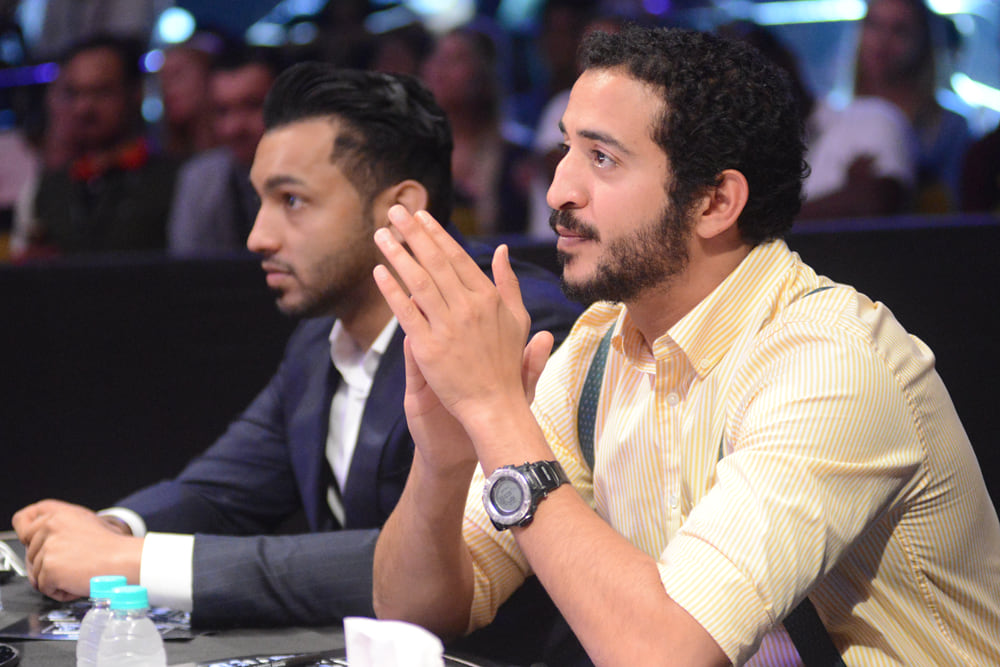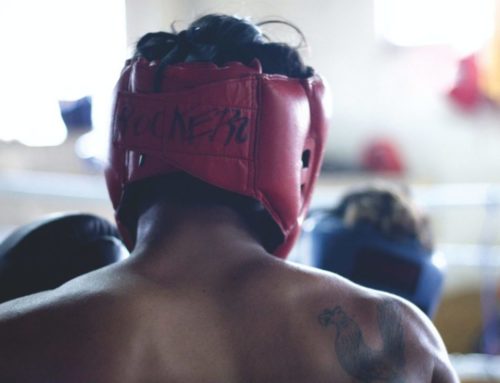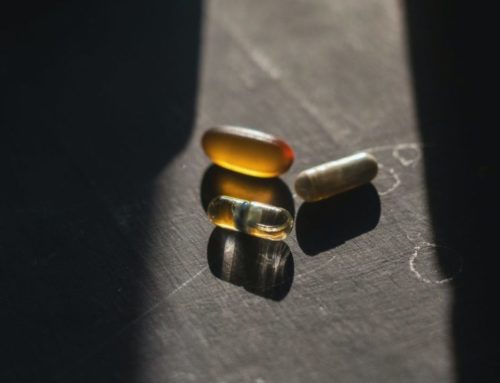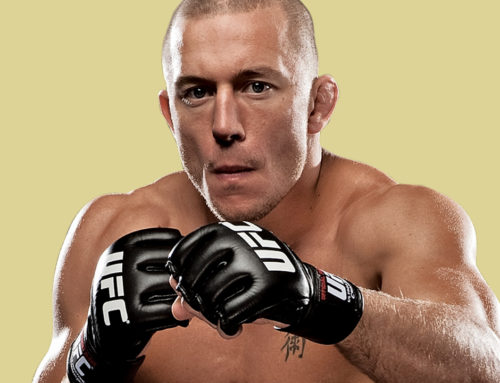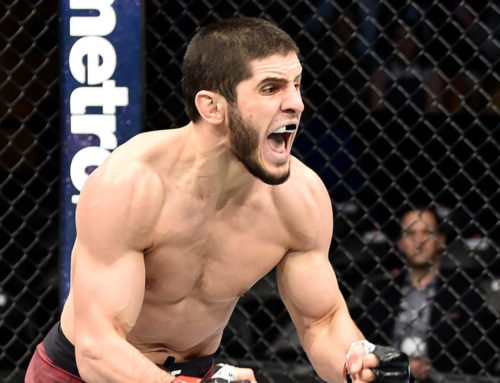Think of countries on the MMA map and Bahrain might not immediately spring to mind. Why would it? In terms of size, it’s tiny, sitting between Kiribati and Dominica as the 176th biggest country in the world (out of 195). Yet, proving size doesn’t matter, this island nation in the Persian Gulf is experiencing huge change and development in its burgeoning MMA community – so big, in fact, royalty is the driving force behind it.
To trace the genesis of this movement, Fighters Only sits down with Mohammed Shahid, the CEO of Bahrain’s Khalid bin Hamad Al Khalifa Mixed Martials Organisation (KHK MMA) and president of the Bahrain-based promotion, Brave Combat Federation, who is, in every respect, a mixed martial arts pioneer in his homeland.
He loved fighting as a youngster and wanted “to be the toughest guy” – partially inspired by repeated viewings of Fight Club. However, MMA was not a big deal where he lived. There were gyms to train BJJ and traditional martial arts, but nowhere that he believed that could make him into a fighter. To compensate, he dropped out of school and spent the next several years learning skills and the fight business.
“I was forced to train myself, learn from YouTube, learn the business, understand I have to promote myself and get in touch with promoters, shows and managers,” he tells FO.
“It’s not about black belts anymore. It’s about actually going and fighting. I went and fought and came back and it was tough for me to accept [the teaching]. I had to do a lot of competition and accept a lot of challenges at the gym, you know, like the old school. I had to go back to the Gracie times. It was fun for me to do that because fighting was everything. It was like a movie for me.”
His career took him to Thailand to train, and India’s Super Fight League to compete. But developing himself wasn’t his only goal. He wanted to help his country embrace his sport. The key, he says, was to teach and develop more fighters.
Shahid started his own gym, Bahrain MMA, and cites one of its products, Hamza AlKooheji, as one of his major success stories. Arguably, it was his co-main event in Bahrain for the Desert Force organization that was the catalyst for an MMA explosion. One of the interested observers of that show was His Highness Shaikh Khalid bin Hamad Al Khalifa, a member of the country’s royal family, whose net worth is estimated to be in the billions of dollars.
“I got a call from the prince of Bahrain, Shaikh Khalid, who is the fifth son of the king,” says Shahid. “When I met him I knew that was it. He had the same vision I had to build mixed martial arts.”
The first job was to create an infrastructure. Shahid didn’t have a promoter, manager or experienced pro fighter mentoring him, but the Shaikh Khalid overcame those problems by bankrolling KHK.
“He started by saying, ‘Let’s give them resources. Let’s make a gym. Let’s bring in coaches. Let’s bring in some of the best coaches in all the disciplines – from wrestling, to standup, to boxing, to BJJ, strength and conditioning.’ We got an amazing facility and started supporting them, started making tryouts and competition for them.”
Top coaches like Renzo Gracie and John Kavanagh became associated with the new team and the doors were also opened to experienced professional athletes like Khabib Nurmagomedov and Frankie Edgar. The prince even ended up in Edgar’s corner team in the UFC.
“My goal was to tell the world what Shaikh Khalid stands for,” says Shahid. “We want to show what Bahrain is doing for mixed martial arts with KHK MMA.”
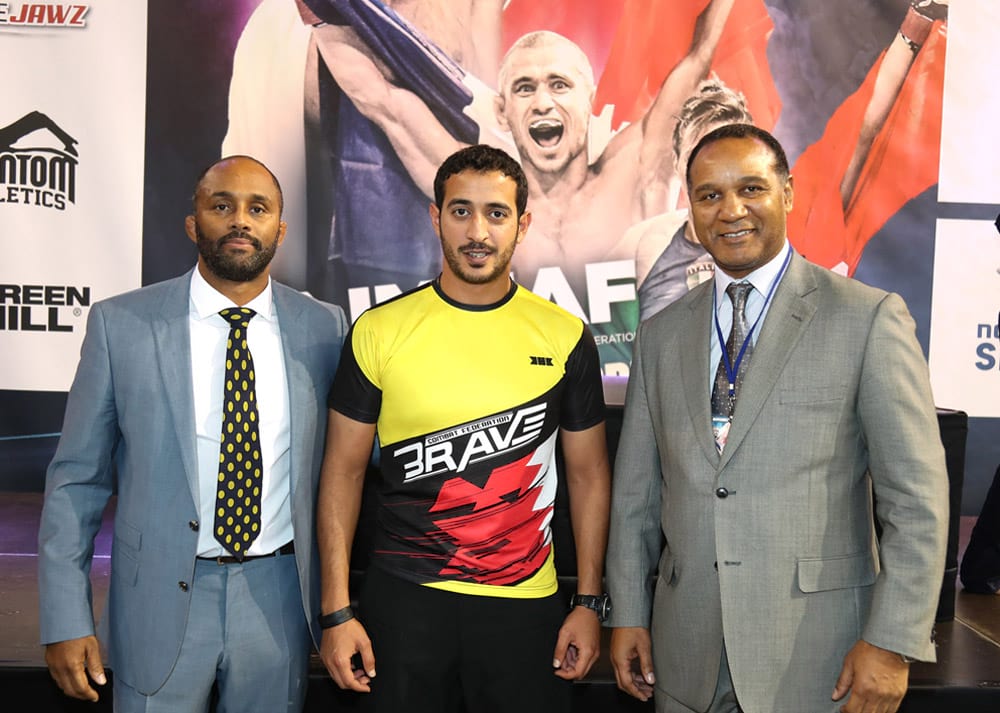
There’s yet to be an influx of Bahraini fighters in the elite ranks and expectations are realistic. It will take time before there are athletes in the UFC title picture. For now, a huge focus has been put on amateur competition.
“The effort we put in the amateur level is so much because I think it is the future of the sport,” adds Shahid. “I think we’re going to scout the best talents – all the promoters and managers are going to have their eye on the amateur level. If you’re going to put your money and time into something, it’s most important to do it at the amateur level.”
KHK has organized domestic amateur competitions to keep MMA’s profile high and give fighters from gyms across the country the in-cage experience they need; experience they can draw upon in international competitions, where the national team is already starting to have success.
The first athlete to get onto the podium at an International Mixed Martial Arts Federation (IMMAF) competition was Hussain Abdulla, a 23-year-old from the capital city, Manama, who only had a passing interest in MMA until it all took off.
“I started training at Reza’s Martial Art Center, one of the biggest gyms in the region, where until now I work as an instructor,” he says. “I heard about MMA before and saw it on TV but I only took an active interest in it when His Highness Shaikh Khalid started popularizing it in Bahrain and organizing trials for his team.
“My coach encouraged us to take part in the trials as it offered a great opportunity to evolve as a fighter and it gave me a chance to put Bahrain on the map of MMA. I was selected after the first trial and I just remember how exciting the whole experience was and how grateful I was for this chance.”
‘Iron’ took bronze at 2015’s European Open, which was a story picked up by the mainstream media back home. His achievements were soon followed by Fahad Abdulrazaq, who also generated headlines and interest after taking bronze in the world championships last year.
“It was amazing,” says Shahid. “For us, for Bahrain, it so important to show our athletes, one of you can actually go and do it. If you see that happening, these guys can wake up and say, ‘We can do it too.’”
These results have helped the MMA word spread. Interest and participation is growing. It’s also set to hit new heights as the IMMAF World Championships of Amateur MMA arrive in November. The competition has been in Vegas for three years as part of the UFC’s International Fight Week, but it’s moving for the first time and it’s arguably a bigger deal than ever before.
“They’re really excited about it,” says IMMAF CEO, Densign White. “I was out there during the Formula-1 grand prix and they had a big event happening during the grand prix inside the event itself, which was fantastic. And the public awareness of the world championships coming to Bahrain was phenomenal. Everyone was asking for tickets.
“Young people are just really interested in the sport over there – they want to join a club and find out how to get involved. The potential for the sport to grow is huge.”
White adds the office of the prince, the ministry of sport, the national Olympic committee and tourist board are all behind the competition. Once again, Shaikh Khalid has been key – both in his efforts to secure the competition and in his support for the athletes.
“He’s just been phenomenal,” says White. “He’s attended all the major events we’ve had. He’s always cageside with his athletes. He blends in. You’d never know he was a member of the royal family. He’s just there with his tracksuit and his cap as part of the team and he’s a great inspiration to his athletes and a great inspiration for everyone involved.
“It’s great for all the other countries, too, to see someone who could be spending his time doing anything he wanted. He’s chosen to spend his time in MMA, working with us to make the sport grow. I think he’s changed the view of the sport in his country. Neighboring countries are changing their views as well.”
The contribution and influence of the Shaikh was recognized when he became the organization’s first patron. But it doesn’t stop there. He’ll again be supporting, guiding and assisting the fighters from Bahrain against competitors from all six continents come November. The aim is to claim their first gold medal.
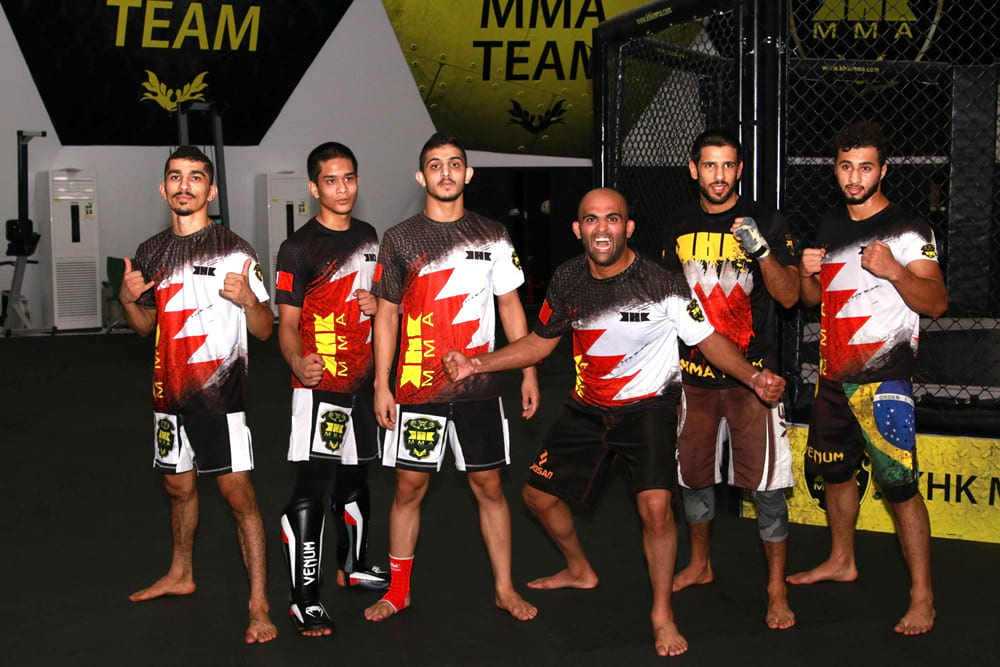
The amateur game isn’t the only focus for emerging Bahraini fighting talent. The professional side of the sport is the next step for many of its athletes, and that’s what Abdulla is aiming for after the worlds. Unlike many fighters new to the full-time game, the promotion he will fight for is set: Brave Combat Federation.
KHK’s pro promotion is yet another outlet for the team to show how much passion Shaikh Khalid has for the sport. His goal, and Shahid’s, is to create an infrastructure that allows martial artists to be as celebrated like stars of mainstream sports.
The idea is to give fighters exposure in the markets where the public will appreciate their abilities – Bahrain and beyond – and prevent non-English speakers not good enough for the UFC getting stuck on the regional scene. They want to focus on the sport, the fighters and the fights – and there have been some good ones in its eight events so far. They want to make MMA like soccer – a sport without language that resonates across the world.
Within a year, the Brave cage has covered thousands of miles and four continents, giving athletes the opportunity to compete globally, as well as giving up-and-coming local talents the platform of an international promotion that has a ton of resources behind it. English-speaking or not, all that matters is that they can fight.
“It was a vision we had to start supporting these fighters and make this sport like any other sport out there,” says Shahid. “That’s how we started with KHK MMA – with that same vision, and we want to make that vision bigger with Brave now.
“Right now, I think the fighters are helping the sport – like Conor McGregor. We want an era where the sport helps the fighters level up. We want to be able to do that with as many fighters as I can.
“He (Shaikh Khalid) doesn’t really care about the business side; he cares about the sport side. He would leave the money on the table just to make sure he gets in these regions and [raises] the level of the sport.”
Frankie Edgar is on board at Brave for color commentary duties. And though the former UFC lightweight champion has just about seen it all in his career, even he was taken aback by the strides the organization is making across the world.
“That area of the Middle East is a special place,” he tells FO. “I’ve been out to Abu Dhabi and Dubai a couple of times and Bahrain – when they want to do something, they get it done. They have the resources and I’m kind of amazed at the production and how quickly they grew the Brave organization. They’re only six events in and they’ve been in Mumbai, India, Brazil, Mexico… It’s amazing what they’re doing.”
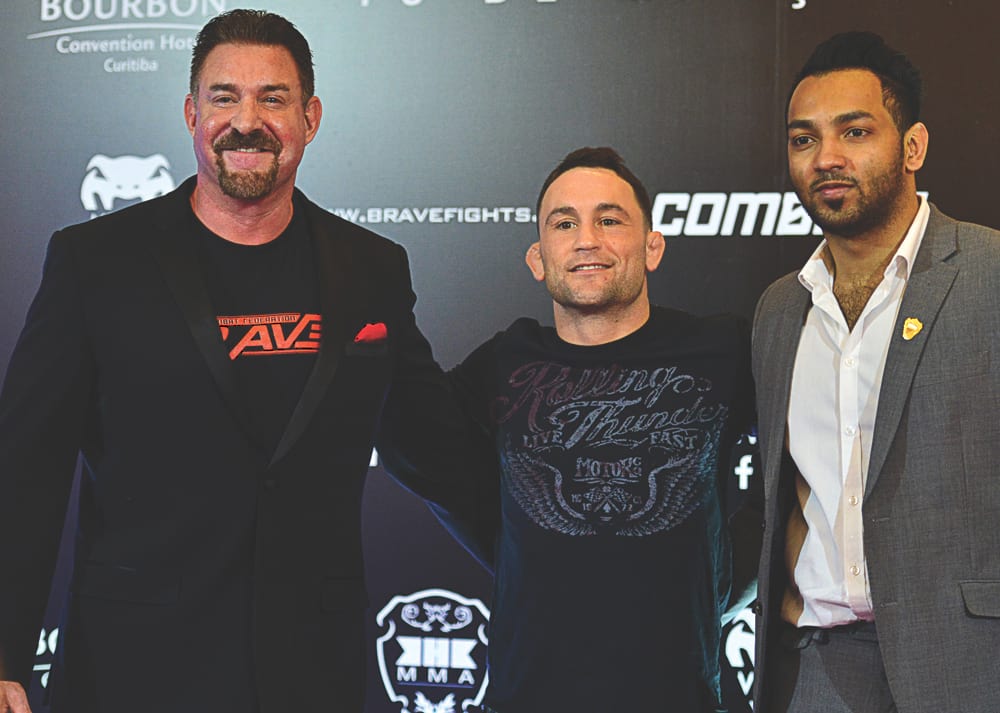
Bahrain loves sport. So does its royal family. When they get their teeth into something, they have the resources and influence to make things happen. Ironman competition, for example, became a big deal because of their involvement. They brought F-1 to the Middle East. One member of the family even sits on the council for soccer’s world governing body, FIFA. It appears as if MMA could be next to get the royal treatment.
Shahid claims that in the 10 months since Brave launched, mixed martial arts has grown to become the second most popular sport in the country. There’s even an MMA course on offer at the University of Bahrain. However, it hasn’t peaked yet.
From November 12th-19th, Brave International Combat Week is set to promote MMA on a scale not yet seen in Bahrain, incorporating the biggest Brave event to date and the IMMAF worlds. It’s set to be a milestone. “Not just for Bahrain, but a for the whole of mixed martial arts,” Shahid insists.
There will also be a pro boxing card where ‘The Hawk’ will compete, as well as His Highness, who is set to star in the main event. His influence is everywhere.
“Shaikh Khalid Bin Hamad Al Khalifa has constantly worked to improve the image of MMA in Bahrain and make it more popular locally and globally, through relentless effort in every imaginable field,” says Abdulla, who has benefited from his support as much as anyone. “We cannot thank him enough for everything he has done for us personally and for the improvement of MMA in Bahrain.”
As the sport continues to receive the royal treatment, it looks set to reach even greater heights.
*** This feature first appeared in the November 2017 issue of Fighters Only magazine ***

